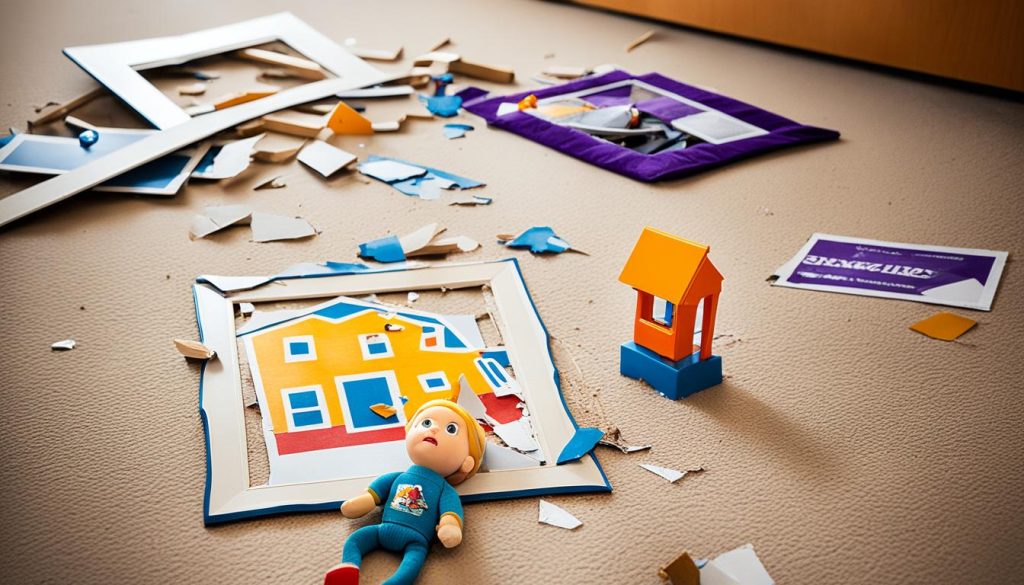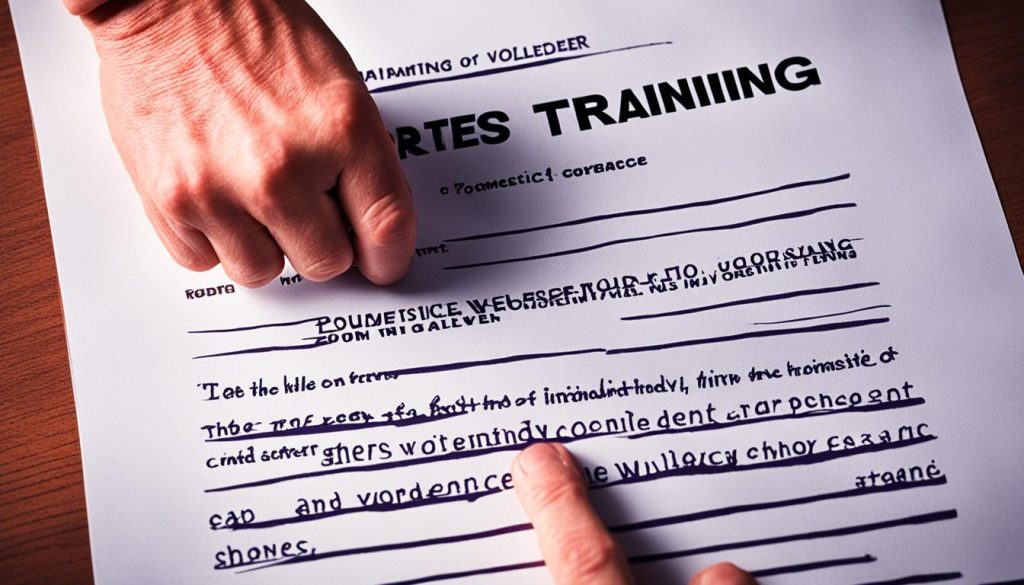Domestic violence, whether it’s emotional or physical, can deeply affect families, especially when child custody is involved. A parent with a history of abuse may lose visitation rights or even have their parental rights taken away1. In the U.S., courts always put the child’s best interests first when deciding on custody, and past domestic violence is a big factor.
If there’s proof of domestic violence, judges in Florida might decide the abusive parent shouldn’t have custody1. In Florida, judges usually think both parents should share custody, but a domestic violence conviction can change that1. Even without a conviction, any signs of domestic violence count in custody cases in Florida1. The more severe the violence, the more likely judges are to order supervised visits or even end parental rights1. Domestic violence can greatly affect a parent’s chance of getting custody in Florida1.
Key Takeaways
- Domestic violence can significantly impact child custody decisions in Florida.
- Judges will consider evidence of domestic violence, even without a conviction, when determining custody arrangements.
- Severe cases of domestic violence may lead to supervised visitation or the termination of parental rights.
- The courts in Florida prioritize the best interests of the child when making custody decisions.
- Seeking legal representation is crucial for individuals accused or with evidence of domestic violence in custody cases.
Understanding Domestic Violence in Family Law
Domestic violence is a complex issue with big legal effects, especially in family law2. It’s not just about hitting someone. It also includes threats, controlling someone’s money, harassment, stalking, and mean words2. What counts as domestic violence can change by state, but it usually means any behavior that tries to control someone else.
Definition and Types of Domestic Violence
In the U.S., domestic violence means a pattern of behavior to control someone else2. This can be hitting, sexual abuse, being mean, or controlling someone’s money. It can happen in any relationship, not just between partners, and doesn’t need to involve sex3.
Legal Consequences of Domestic Violence
Getting caught in domestic violence can lead to serious legal trouble2. You might get restraining orders, supervised visits, or even lose your rights as a parent2. Courts take it very seriously because it can be dangerous for kids2. In places like New Jersey, it covers more than just hitting, like threats or controlling someone’s money2.
Domestic violence can greatly affect family law cases3. In Arizona, if you’re violent at home, it affects custody decisions3. You might get supervised visits, have to go to programs, or face other rules3.
It’s key to talk to a family law lawyer quickly if you’re dealing with domestic violence in custody cases2. Making false claims of domestic violence can also lead to trouble in court, so be careful2.
domestic violence, custody cases, legal impact
In the U.S., courts decide on custody based on what’s best for the child. They look at how well parents work together, the safety of the kids, and the home environment4. Domestic violence can hurt these areas, showing a parent might not offer a safe home4.
The Best Interests of the Child Standard
In Illinois, custody is about what’s best for the child, as the law says4. The focus is on the child’s safety and well-being, especially in cases of domestic violence4. The Illinois Domestic Violence Act of 1986 puts the child’s safety first if one parent has a history of violence4.
Factors Considered in Custody Decisions
Courts need strong proof of domestic violence, like police reports and medical records, to affect custody4. If there’s a threat to the child’s safety, the court might order supervised visits4. Abusive parents might have to take parenting classes or counseling before seeing their kids4.
If there’s domestic violence, custody orders can change to keep the child safe4. You need to show a change in circumstances to ask for a custody change because of abuse4. The court looks at the child’s safety, health, and the risk of more violence4.
If a child is at risk from domestic abuse, the court might change custody to keep them safe4. Following a new custody order is a must, and ignoring it can lead to legal trouble4. You can ask for changes in custody if things change later4.
| Factors Considered in Illinois Custody Cases | Impact of Domestic Violence |
|---|---|
| Child’s parents’ wishes | Domestic violence may indicate a parent’s inability to provide a safe and stable environment for the child5. |
| Relationship with parents, siblings, and adjustment to home, school, etc. | Domestic violence can disrupt the child’s sense of stability and safety in their home environment5. |
| Illinois defines domestic violence as injuring, threatening, or harassing family or household members | Such acts can be used as evidence of a parent’s unfitness and the need for supervised visitation or custody modifications5. |
| Violation of a plenary order of protection can lead to jail time and fines in Illinois | Courts take domestic violence violations seriously when making custody decisions to protect the child’s wellbeing5. |
In Illinois, courts focus on domestic violence claims in custody cases5. They assume it’s not good for a child to be with an abusive parent5. The court might order supervised visits to protect the child and the other parent5.

A study looked at 190 mothers with minor kids who filed for divorce in a big Illinois county from 2009 to 20136. Only a few cases mentioned intimate partner violence in court records6. Physical cruelty was rare, but mental cruelty was more common among women facing IPV, especially those facing coercive controlling violence6.
Women seeking sole custody spent about 18 months more in court6. Cases with IPV took longer to settle6. Lawyers might not report IPV in custody cases because it can lead to worse outcomes for women6.
A $1.2 million grant helped researchers study how training attorneys to spot and address intimate partner violence in divorce and custody cases works645.
Potential Custody Arrangements in Domestic Violence Cases
When domestic violence is a factor in a custody dispute, courts may make special rules to keep children safe. These rules aim to protect the victims and make sure the children are looked after. They often include supervised visitation or, in extreme cases, ending the abusive parent’s rights78.
Supervised Visitation
Supervised visitation means the abusive parent sees the child with someone watching over them. This is done to stop more harm and keep the child safe8. The court looks at things like if the parent has gone through treatment, followed orders, and changed their ways when deciding on visitation rules8.
Termination of Parental Rights
In very serious cases of domestic violence, the court might take away the abusive parent’s rights. This is done when the child’s safety can’t be ensured, even with supervision78. Taking away these rights means the legal tie between the parent and child is cut, keeping the child safe8.
In cases of domestic violence, the court’s main goal is what’s best for the child. They look at how bad the abuse was, if the parent is trying to change, and the child’s overall health8. These cases can be hard to guess the outcome of, as courts try to keep the child safe while respecting parents’ rights8.
Handling custody cases with domestic violence is tough and emotional. Getting help from experts like lawyers and mediators is key to getting the best outcome for the kids9.

Knowing about custody options in domestic violence cases helps families get ready for court and fight for their kids’ safety. The main aim is to give children a stable and caring place, focusing on their needs in tough times789.
Protecting Children from Domestic Violence
Domestic violence can have severe effects on children, now and later. Luckily, there are legal ways to keep kids safe. Getting restraining orders and temporary custody is key.
Obtaining Restraining Orders
In the U.S., victims of domestic violence can get civil orders of protection, or restraining orders10. These orders stop the abuser from contacting or harming the victim and their kids. They also decide on custody and visitation rights10. Domestic violence covers many types of abuse, like physical, sexual, and emotional10.
In places like New York, victims can ask for restraining orders through family or supreme courts10. These orders can last from one to five years and can be extended10. Having one is important in custody cases, showing the court’s concern for the child’s safety.
Temporary Custody Arrangements
Courts focus on the child’s best interests when dealing with domestic violence11. This might mean the abusive parent gets limited or no access to the child1112.
The court looks at evidence like police reports and school records when making decisions11. If abuse is proven, the court might stop joint custody. The abusive parent could lose custody and visitation rights11.
Victims should reach out to groups like A New Leaf and the Arizona Coalition to End Sexual and Domestic Violence11. These organizations offer help, legal advice, and services during tough times.

Getting restraining orders and temporary custody helps victims protect their kids from abuse. These legal steps are key to keeping families safe and secure111210.
Conclusion
Domestic violence deeply affects child custody cases, with courts focusing on what’s best for the child13. Knowing the legal effects of domestic violence and how to protect kids helps families deal with these tough situations131415. If you’re dealing with custody issues due to domestic violence, getting advice from a skilled family law lawyer is key.
The court looks closely at domestic violence when deciding on custody13. Kids who see domestic violence might act out or feel bad, and they’re more likely to get hurt themselves13. Courts use many kinds of evidence, like reports from child welfare and mental health experts, to keep the child safe13.
When there’s domestic violence, courts usually give custody to non-abusive parents 70-80% of the time14. The abusive parent might get limited or no visitation in 10-20% of cases14. What helps kids and their non-violent parents get custody is important, as courts want to protect the child’s well-being13.
FAQ
What is the legal definition of domestic violence?
In the U.S., domestic violence means more than just hitting. It includes threats, controlling someone’s money, stalking, and even just yelling at someone.
How can domestic violence impact child custody cases?
Domestic violence can greatly affect custody decisions. It shows a parent might not be able to keep a child safe or provide a stable home. The court looks out for the child’s best interests when deciding custody.
What are the potential legal consequences of domestic violence in custody cases?
Being violent can lead to big legal problems. You might get restraining orders, have visits watched, or even lose your right to be a parent in the worst cases.
How do courts determine the “best interests of the child” in custody decisions involving domestic violence?
Courts look at many things to decide what’s best for the child. They check if parents can work together, if the child is safe, if parents are fit, and if their homes are stable.
What are the different custody arrangements that may be ordered in cases of domestic violence?
If there’s domestic violence, courts might order special custody setups. This could mean visits watched by others or, in serious cases, taking away a parent’s right to be involved.
How can victims of domestic violence protect themselves and their children in custody disputes?
Victims can fight back by getting restraining orders. These can be proof in custody cases and might lead to safer custody setups for the kids.
Source Links
- How Does Domestic Violence Affects Child Custody in Florida – Fighter Law
- How Domestic Violence Affects Your Custody Case
- How Does Domestic Violence Affect A Child Child Custody Case
- How Domestic Violence Can Impact Child Custody In Illinois
- How Domestic Violence Affects Child Custody in Illinois
- How intimate partner violence affects custody decisions | College of Agricultural, Consumer and Environmental Sciences
- Child Custody and Visitation Decisions in Domestic Violence Cases: Legal Trends, Risk Factors, and Safety Concerns (Revised 2007)
- Does Domestic Violence Have Any Impact on Child Custody Cases?
- Domestic Violence in Family Law
- How Domestic Violence Affects Child Custody in New York
- HOW DOES DOMESTIC ABUSE AFFECT CHILD CUSTODY?
- Domestic Violence Affects Child Custody More Than You Know
- How does domestic violence impact child custody decisions? – Fischer & Van Thiel, CP | Carlsbad, CA
- What’s the impact of domestic violence on child custody decisions? – Fischer & Van Thiel, CP | Carlsbad, CA
- The Impact of Domestic Violence on Child Custody Cases.pptx

